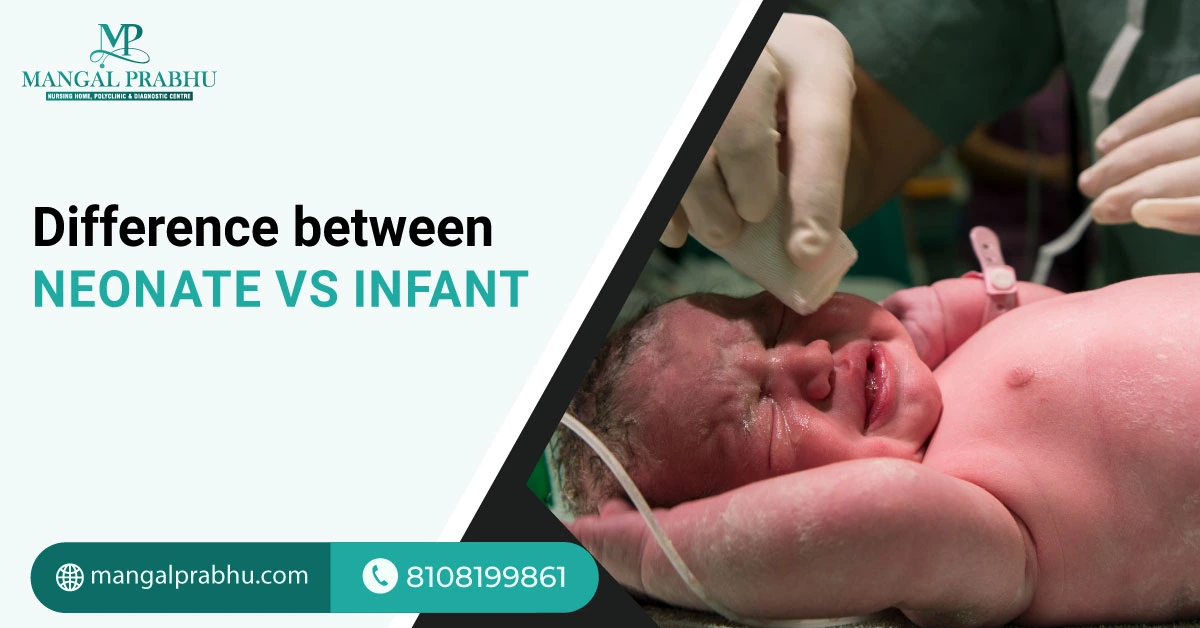
Difference Between Neonate vs Infant
We call babies with different cute terms. But did you know there’s a medical term used for babies of different ages? Neonates, infants, and toddlers are a few of the most common terms people use to describe babies of certain ages. In this post, we’ll take a look at the terms that a paediatrician in Navi Mumbai commonly uses to address a baby. Although the terms “neonate and infants” are often used interchangeably, here’s what makes neonates different from infants and toddlers.
Characteristics of a Neonate
1) Age Range
Generally, people consider children between 2 and 3 months old babies, but medically, they are referred to as neonates. A baby who is 28 days old or younger is called a neonate. During this stage, the baby is adapting to life outside the womb.
2) Physical and Developmental Milestones
Babies tend to develop rapidly in the first few months, usually up to a year. In the first month of their birth, they develop a sucking reflex and startle reflex. They sleep for the longest period, mostly 16-20 hours a day. However, it’s important that you wake them every few hours (as recommended by your pediatrician) for feeding. Crying is their only way to tell their needs.
3) Common Health Considerations
Neonates require extra care from their caregivers and medical staff as they are still adjusting to a new life. They might experience breathing difficulties, a higher risk of jaundice, infections, and feeding difficulties (especially in premature babies).
Characteristics of an Infant
1) Age Range
An infant is one month to one year old and experiences many rapid developments during this time. All neonates are infants, but infants are not considered neonates.
2) Physical and Developmental Milestones
An infant develops at different paces, but most babies tend to recognize their parents, smile, and make sounds by the time they are 3-4 months old. They learn to hold their heads up, follow things, and understand colors and patterns. They start sitting with support by 6 months and grasp objects. They may learn to crawl and stand with support by 9 months until they finally take their first baby steps at one year.
3) Common Health Considerations
Although infants have comparatively stronger immunity than neonates, they are still developing. They might experience teething issues, such as irritability and discomfort. Infection is also common among infants, as they tend to explore their environment and pick random objects. Food allergies can also occur. It’s important to see a specialist at a children’s hospital in Navi Mumbai before starting solids.
Differences Between Neonates and Infants
Here are some common differences between a neonate and an infant:
| Basis | Neonate | Infant |
| Nutritional Needs | Breast milk or formula milk | An infant above 6 months old needs a liquid and semi-solid diet along with formula/breast milk. |
| Sleep pattern | Requires 16-20 hours of sleep | Requires 12-14 hours of sleep |
| Development | Moro and sucking reflex | Sits, crawls, stands, and learns to speak |
Understanding the different phases of childhood will prepare parents to take the best care of their little ones.
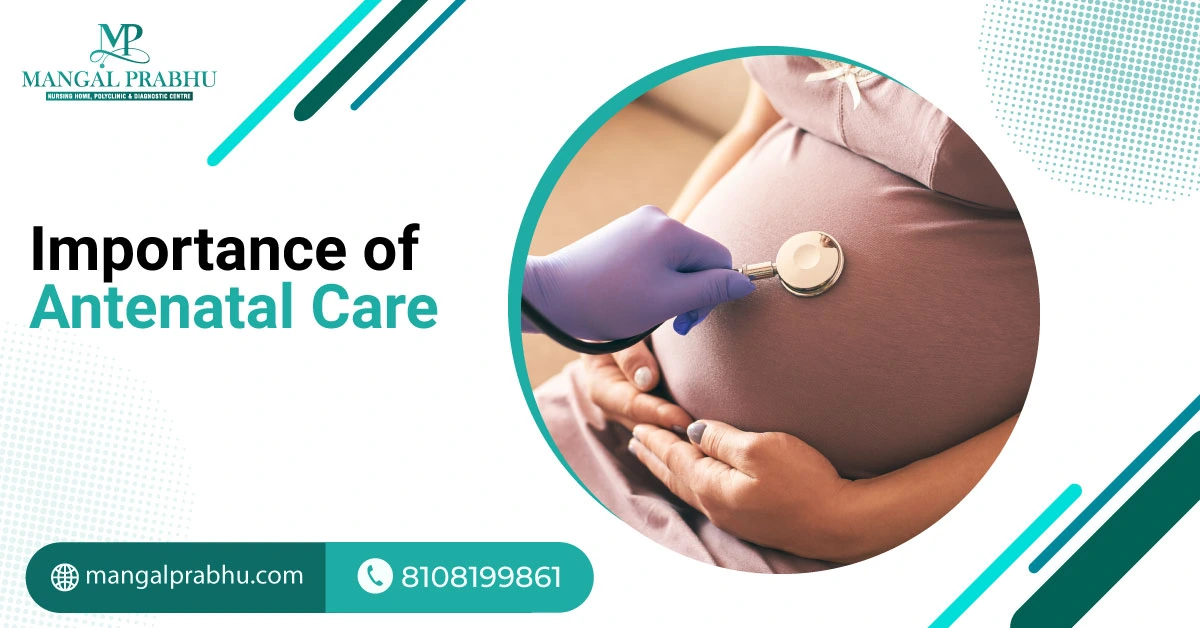
Importance of Antenatal Care
Pregnancy and childbirth are the toughest periods for women. Whether it’s your first pregnancy or the third, pregnancy symptoms and the fear of labor can be too overwhelming to handle. To help you cope with these challenges, a gynecologist in Navi Mumbai offers antenatal care.
It’s about ensuring a smooth pregnancy and an easy transition to the postpartum phase. The classes equip you with the knowledge and skills to handle pregnancy, labor, childbirth, breastfeeding, and your parenthood journey effectively. Here’s why antenatal care is important:
Benefits of Antenatal Care
Here’s why every woman needs to consider antenatal classes or an all-inclusive maternity care program:
a) Ensure Healthy Pregnancy:
Antenatal care is mostly about taking care of the mother and the fetus during pregnancy and in the initial stages of parenthood. Your gynecologist will run tests, like blood tests, urinalysis, and ultrasounds, to check your and the baby’s wellbeing.
b) Monitoring Fetal Development:
Regular fetal monitoring is part of your antenatal care program. The doctor will check the baby’s heartbeat, position, and overall growth using physical examination and ultrasound tests.
c) Early Detection of Health Issues:
Some women might develop hypertension, gestational diabetes, anemia, and other medical complications during pregnancy. Identifying and addressing these problems early can prevent complications during delivery.
d) Nutritional Guidance:
Your body demands a nutrient-rich diet, particularly foods rich in fiber, protein, essential vitamins and minerals, etc. Antenatal care ensures that you get sufficient amounts of these nutrients through your diet. If not, your doctor will prescribe calcium, iron, and other supplements to meet your body’s increasing demand for these nutrients.
e) Help Deal With High-Risk Pregnancies:
Women with high-risk pregnancies, such as those with diabetes, high blood pressure, thyroid issues, a history of miscarriage, and other medical conditions, require regular monitoring. Your doctor may also advise you to get an ultrasound every few weeks to ensure your baby’s optimal growth.
Components of Antenatal Care
Here’s what the antenatal care program includes:
i) Regular Checkups and Screenings:
You will need to schedule a visit to the maternity hospital in Navi Mumbai every month or more frequently depending on what your gynecologist advises. You also need to get regular screenings in the first, second, and third trimesters to track your baby’s growth.
ii) Educational Support:
Antenatal care allows you to ask your doctor all the questions you have regarding pregnancy, childbirth, breastfeeding, and postpartum care. Your doctor will prepare you for childbirth by discussing different delivery methods, their pros and cons, recovery after delivery, and so on. You will also learn breathing techniques.
iii) Immunizations and Supplements:
Tetanus shots during pregnancy are necessary for the protection of both you and your baby. For RhD-negative mothers expecting RhD-positive babies, an anti-D injection is given to prevent the formation of antibodies in the mother’s body.
Conclusion
Prenatal checkups are not just about hospital visits and screenings. These are an important part of your pregnancy journey. It’s a comprehensive program that covers everything from your nutrition to labor management techniques. Talk to your healthcare provider about the antenatal care offered and the services included.
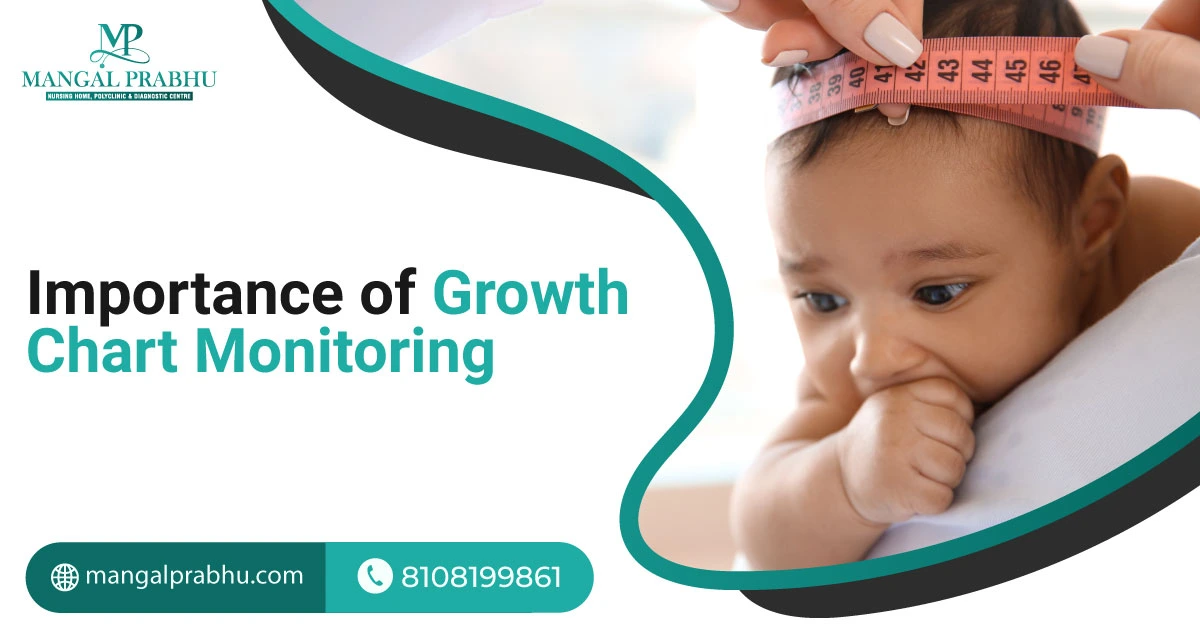
Importance of Growth Chart Monitoring
Holding your little one in your arms for the first time is one of the most rewarding experiences for parents. Parents will see their babies achieve new milestones every month. From flashing the first smile to crawling to taking their first step, each growth phase brings something new. You may also need to visit the children’s hospital in Navi Mumbai regularly to ensure your baby’s growth is on track and they aren’t experiencing any health-related issues.
The question is, how do you know if your infant or toddler is growing at the right pace? A growth chart is the best way to know what milestones your little ones are supposed to achieve by what age. Let’s see what it is, how it works, and the importance of growth chart monitoring.
Understanding Growth Charts
A growth chart consists of some vital parameters, like weight, height, and head circumference. It measures your baby’s growth, compares it with that of other babies, and suggests whether your baby’s growth is on track. Any unusual change in your baby’s growth can be identified and addressed promptly.
Benefits of Growth Chart Monitoring
Here’s why every parent should consider growth chart monitoring.
i) A Must for Newborns:
Babies tend to grow fast in the first few months after birth. Their feeding habits, sleep cycles, behavior, and physical growth change significantly. A growth chart is an effective monitoring tool that ensures your newborn is growing like a normal baby.
Also Read: How to Stop Diarrhea in Infants?
ii) Early Detection:
Growth chart monitoring is a proactive approach that helps parents detect any abnormalities in their babies early on. Before the issue escalates, it’s quickly detected and can be treated promptly.
iii) Proper Nutrition:
It’s hard for parents to know whether their little ones are getting the proper nutrition. If you want to ensure your baby is feeding well and is developing properly, use a growth chart. If you see any deviation, it could be a sign you may need to use supplementation.
How to Use Growth Charts
It may seem daunting at first, but a growth chart is easy to use. Let’s see what parameters you need to measure first:
- Weight
- Height
- Head circumference
Percentile is the next important factor. Ideally, babies should grow at a consistent rate to ensure they are developing normally. If you notice any sudden or severe deviation, see a pediatrician to rule out any potential growth issue. So, how exactly do you understand the percentile? Let’s say your baby’s growth chart shows they are in the 70% percentile for weight. This means they weigh 70% more than kids their age.
It’s important to consult a child specialist in Navi Mumbai regularly for at least the first few months. They will plot your baby’s growth and tell you if their growth is on track.
Conclusion
While a growth chart is an excellent baby’s growth monitoring tool, the numbers in it alone can’t predict or prove anything. Besides, the percentiles tend to fluctuate. If your child seems playful, happy, is feeding well, and seems to be achieving their regular milestones, these are the good signs. Still, if you have any concerns, meet your pediatrician.
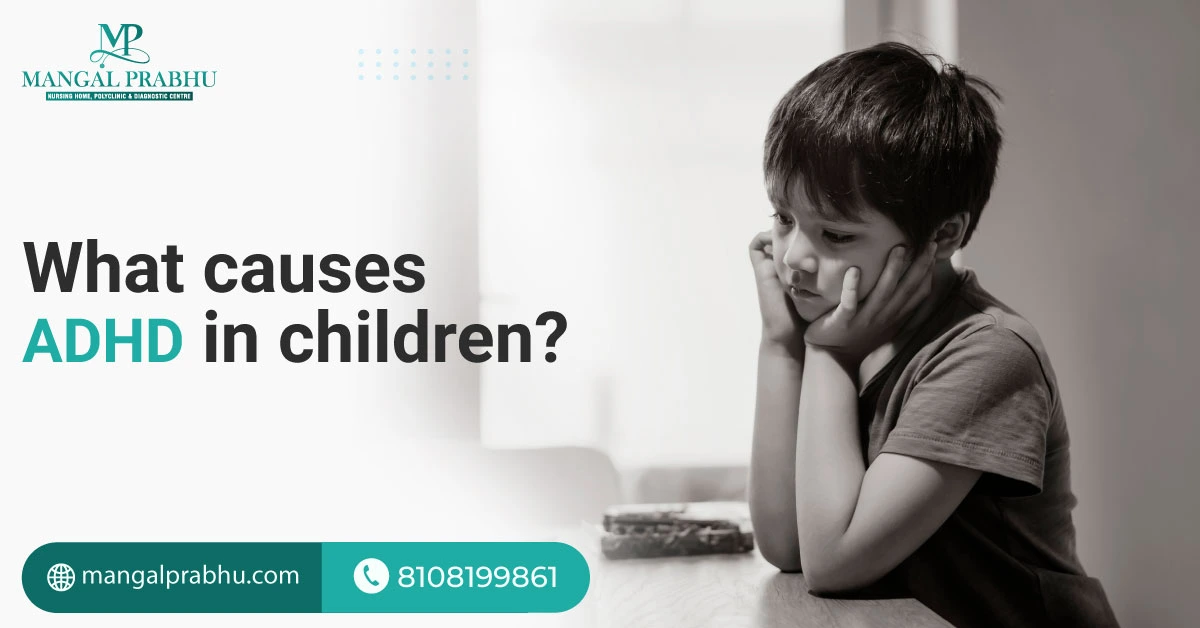
What Causes ADHD in Children?
Attention-deficit Hyperactivity Disorder is a neurological condition that affects the child’s ability to concentrate and self-control. Children with ADHD tend to behave differently and often struggle with family relationships, socializing, and maintaining good academic performance. This neurodevelopmental disorder affects millions of kids worldwide.
Although it can’t be cured and might even last till adulthood, a pediatrician in Navi Mumbai can help you manage its symptoms and improve your quality of life. Let’s see what causes ADHD in children.
What causes ADHD in children?
1) Genetic Factors
ADHD runs in families. Kids with parents, siblings, or a blood relative with this condition are more likely to develop it than other kids with no such genetic history. In fact, studies show that children of parents with ADHD are 50% at an increased risk of developing this neurodevelopmental disorder, and those with elder siblings with ADHD have a 30% risk.
Researchers haven’t discovered a single gene responsible for an increased risk, though. It’s believed that a combination of genes plays a part in making a kid more vulnerable to attention-deficit hyperactivity disorder.
2) Environmental Influences
Hyperactivity and inability to self-control are observed in children with poor brain development. One of the reasons that may contribute to this is lead exposure at a young age. Lead can interfere with your child’s neurodevelopmental milestones.
Prenatal exposure to certain chemicals and toxic substances is also linked to ADHD in children. If the mother smokes, drinks alcohol, or works in an environment where she’s exposed to lead, pesticides, and other industrial chemicals, the risk of the offspring developing ADHD increases. The environment at home can also affect the risk.
3) Neurobiological Factors
Children with ADHD have a different brain structure than normal kids. Neurotransmitters, such as dopamine and norepinephrine, may not be at normal levels, affecting the child’s ability to focus, control impulses, and execute tasks without getting distracted.
4) Lifestyle and Diet
Diet isn’t directly linked to ADHD, but it’s possible that consumption of certain foods can aggravate your symptoms. If your child eats lots of sugary foods and preservatives, they might be at an increased risk of getting ADHD. The symptoms can also be seen in nutrient-deficient children, particularly those with a diet that lacks omega-3 fatty acids, iron, and vitamin D.
Another factor is lifestyle. It’s not considered a direct cause, but certain lifestyle choices can worsen your symptoms. For instance, ADHD can interfere with your sleep routine. So, having a consistent bedtime routine and good quality sleep can help.
How to Manage Your Symptoms
ADHD treatment in Navi Mumbai focuses on managing symptoms. In addition to medication and behavioral therapies, these tips can help you with ADHD symptoms:
- Exercise regularly to improve blood flow to the brain
- Limit screen time to prevent overstimulation of the brain
- Create a calm and stress-free environment at home
- Be supportive and patient
- Provide a balanced diet full of essential vitamins and nutrients to your child
A few tips can go a long way in managing ADHD symptoms in children. With support and a good diet, your children can focus better and have good impulse control.
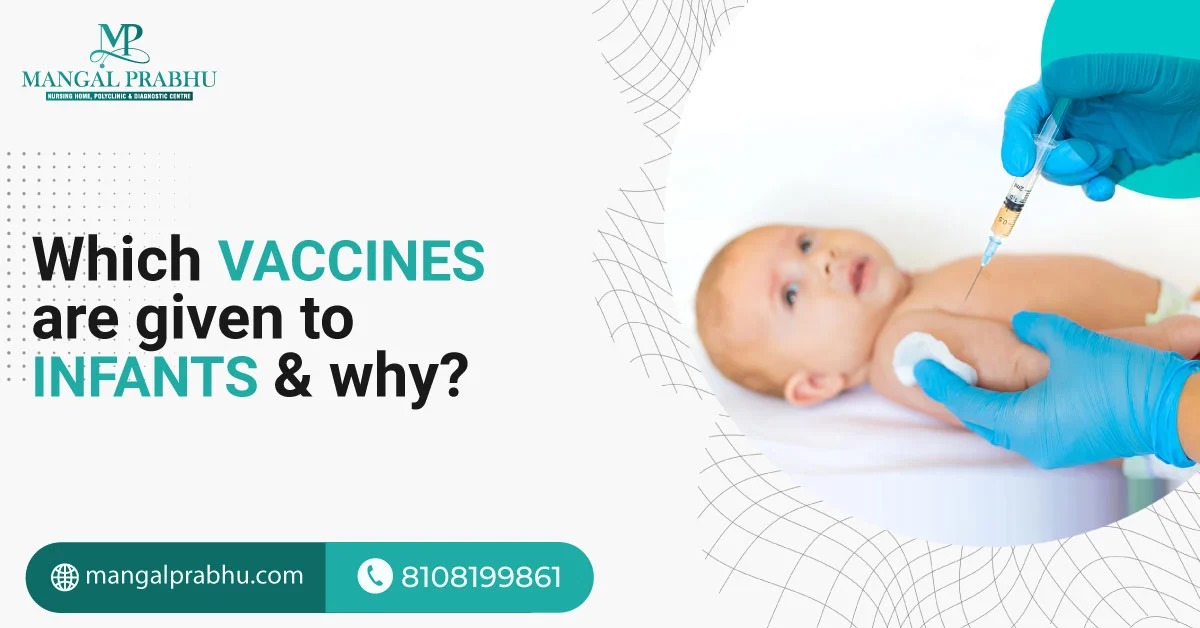
Which Vaccines Are Given To Infants and Why?
Nobody likes to see their just-born baby getting vaccinated. However, immunization can prevent your babies from deadly diseases. A baby’s immune system is not fully developed, which puts them at an increased risk of certain illnesses and, eventually, hospitalization.
Many children die because of diseases that could have been easily prevented with vaccines. Your pediatrician in Navi Mumbai will give you a detailed list of the baby’s immunization schedule. We’ve compiled this detailed guide to help you understand different vaccines, the required dosage, and when they are given. Let’s see which vaccines are given to infants & why.
Vaccines Administered at Birth
1) Hepatitis B
It is the first shot administered to babies within 24 hours of life. The vaccine protects them from hepatitis B, a liver infection that’s highly likely to turn into a chronic liver illness if an infant contracts it. The vaccine is given right after birth to reduce the risk of the infant contracting the virus from the infected mother or other close ones. This vaccine is administered in three doses — one at birth, another in 1.5 months, and the last in 3.5 months.
2) Vaccines Given in the First Year
i) DTaP Vaccine:
Diphtheria, Tetanus, and Acellular Pertussis, short for DTaP, is a range of life-threatening illnesses that have killed many babies in the past. Diphtheria is a serious throat inflammation that can also lead to kidney and heart damage in young babies. Tetanus bacteria get into your body through an open wound. Pertussis is a whooping cough, particularly dangerous in babies.
ii) Hib Vaccine:
Haemophilus influenzae type b disease can cause serious brain or spinal infections in children under five. The Hib vaccine is administered in three doses (at 6 weeks, 10 weeks, and 14 weeks). It protects the baby from ear infections, throat inflammation, meningitis, and other serious infections.
iii) Polio Vaccine (IPV):
Polio vaccine protects babies from a deadly poliovirus that can result in paralysis and death. It’s also given in three doses.
iv) Pneumococcal Vaccine (PCV):
The pneumococcal vaccine protects babies from Streptococcus pneumoniae, a serious bacteria that can cause pneumonia, meningitis, and even sepsis in some cases.
v) Rotavirus Vaccine:
Rotavirus prevents diarrhea in infants. Severe diarrhea that causes frequent watery stools with fever, vomiting, and abdominal pain can cause dehydration in babies, and some need to be hospitalized. The vaccine is administered in 2-3 doses.
3) Vaccines Given Between 12 and 18 Months
a) MMR Vaccine:
The MMR vaccine is given in two doses, and once vaccinated, the child is protected from mumps, measles, and rubella for lifetime.
b) Varicella Vaccine:
Another vaccine included in the child’s routine immunization schedule is varicella for protection from chickenpox. The vaccine is administered in two doses and can mitigate the risk of disease severity or complications if the vaccinated child contracts it.
c) Hepatitis A Vaccine:
Hepatitis A vaccine offers life-long protection from the viral infection that can cause liver diseases. It spreads through an infected person or by ingesting contaminated food.
Conclusion
Children’s immunization in Navi Mumbai is done at private pediatric and government hospitals. It’s important to keep track of your child’s vaccination schedule and get every dose at the right time.
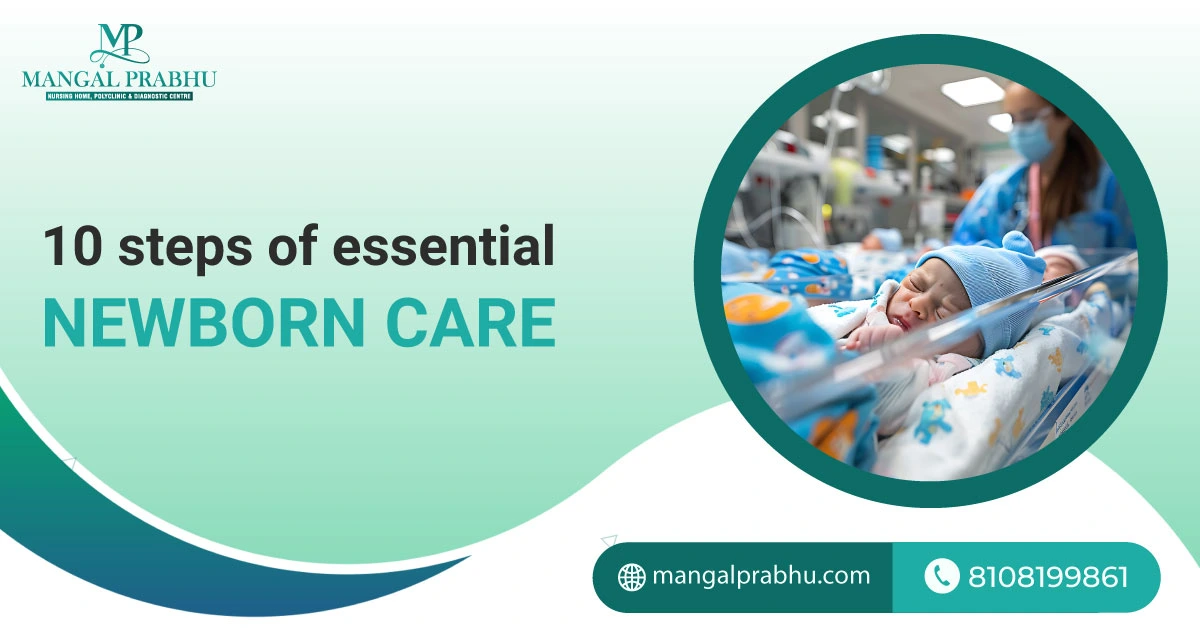
10 Steps of Essential Newborn Care
Newborn care is essential for healthy and proper development during those first precious moments and days. Your little one needs the best care and immense parental love and attention for steady growth.
To help you understand basic newborn care practices, we’ve researched 10 steps of essential newborn care that every parent needs to know. Here’s what to follow at the children’s hospital in Navi Mumbai and after discharge.
10 Steps of Essential Newborn Care:
Step 1: Immediate Skin-to-Skin Contact
Skin-to-skin contact, or the direct contact of the newborn with the mother, takes place naked on the mother’s chest, such that only her face is visible. Generally, most practitioners have been observed to conduct skin-to-skin contact within 10 minutes immediately after birth.
Soon after delivery, placing the baby on the mother’s chest tends to regulate the child’s temperature, breathing, and heart rate. It encourages bonding and provides emotional security right after delivery.
Step 2: Delayed Cord Clamping
Delaying the clamping of the umbilical cord to 1-3 minutes allows for more blood to continue flowing from the placenta to the baby. This generally helps boost the babies’ iron levels and reduces the chances of those babies developing anemia.
Step 3: Initial Breastfeeding
An early introduction to breastfeeding is essential. Breast milk provides the baby with all the nutrients and antibodies that protect them from infections.
Step 4: Proper Hygiene and Cord Care
Bathe the cord area and keep it dry to avoid infection. The cord will fall off automatically within a few days, so do not try to pull it off manually.
Step 5: Temperature Regulation
Newborns are sensitive to temperature, and warmth is essential for maintaining temperature levels. Cover them with blankets or warm clothes, especially in the first few days. However, void overclothing. The room temperature must be comfortable.
Step 6: Eyes Care and Administration of Vitamin K
Eye care involves newborn antibiotic eye ointment to prevent infection. A Vitamin K shot prevents newborns from getting bleeding disorders, which they are vulnerable to in the early days. Breast milk doesn’t have an adequate amount of Vitamin K, so it’s important to introduce them to vitamin K drops.
Step 7: Immunizations and Screening Tests
Newborns should receive their first vaccinations, including hepatitis B, to protect them from serious infection. Their screening tests, including hearing and metabolic, may identify problems early on.
Step 8: Monitoring for Jaundice
Jaundice is a common condition in newborns. Regular monitoring detects whether the skin or eyes start to yellow so treatment can begin before complications arise.
Step 9: Safe Sleep Practices
Newborns may be positioned on a firm mattress on their backs as a preventive measure against sudden infant death syndrome. Ensure that every loose bedding and pillow is removed from the baby’s sleeping environment.
Step 10: Regular Health Check-ups
Regular visits to the doctor in the first few weeks track development and check whether the baby is developing well and in tandem with set milestones. A pediatrician will walk parents through this crucial stage of assessment.
Conclusion
Following these 10 essential steps for newborn care ensures that your baby gets the attention and support needed for a healthy start, from skin-to-skin contact and regular check-ups to all the essentials covered here. Consult a pediatrician in Navi Mumbai for professional guidance and support during this vital stage.
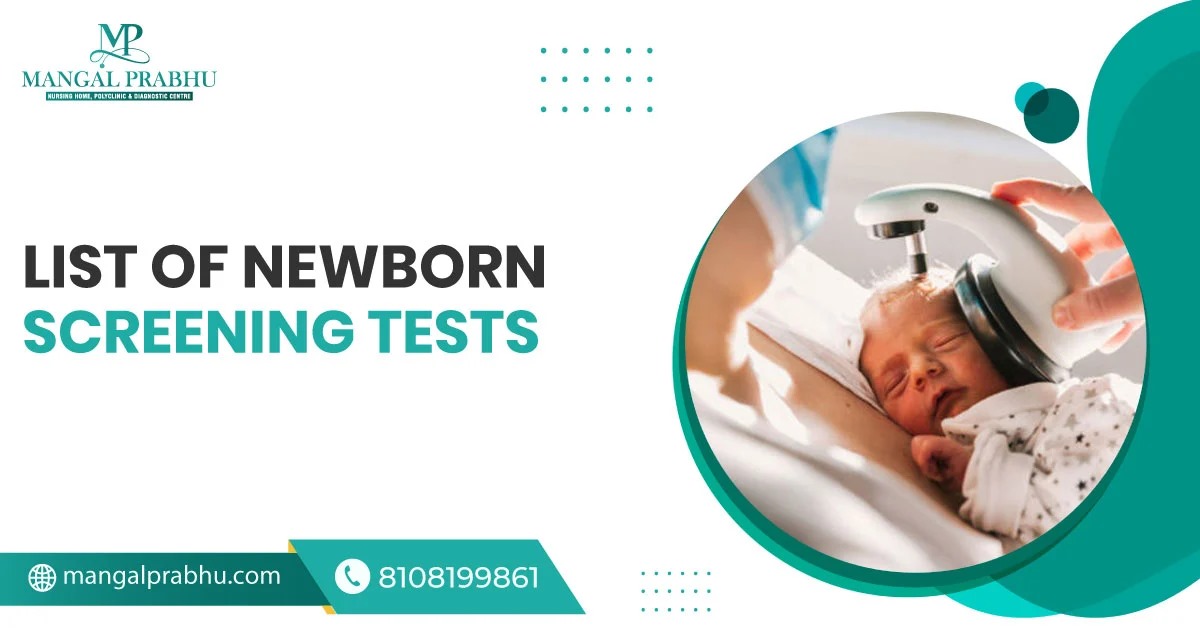
List of Newborn Screening Tests
When a baby is born, they are tested for severe yet rare medical conditions that can be fatal to the baby’s health if left undiagnosed and untreated. Your baby might not show signs of illness, so newborn screening tests are mandatory for all babies. Early detection is crucial, as it helps the pediatrician in Navi Mumbai identify problems that require medical attention.
If you are also close to your delivery date, knowing about different newborn screening tests is essential to childbirth preparation. Below, we’ve compiled a list of the common screening tests conducted at most children’s hospitals in Navi Mumbai.
Common Newborn Screening Tests
1) Hearing Screening:
The healthcare provider will use tiny microphones to detect how your baby responds to sound. The doctor connects the microphone to a monitor, which records the echo produced by your baby’s ears. The hearing test shows whether your baby has a normal hearing capacity.
2) Metabolic Disorder Screening:
Your baby will be tested for metabolic disorders before they leave the hospital. Metabolism refers to your body’s ability to convert food into energy. Problems with a newborn’s metabolism can lead to life-threatening consequences when left untreated. The healthcare provider will take a blood sample from your baby’s heel and send it to the lab for testing.
3) Critical Congenital Heart Disease (CCHD) Screening:
The pulse oximetry test is a simple test that detects heart disease in newborns. It takes barely five minutes and is performed using a sensor that detects the oxygen in your baby’s blood and pulse rate.
Conditions Detected by Newborn Screening
Newborns with metabolic disorders are unable to process foods properly. This can lead to a wide range of disorders, some of which can affect brain function and cause liver damage. Metabolism test detects problems like hypothyroidism, cystic fibrosis, sickle cell disease, Phenylketonuria, and galactosemia.
Most genetic disorders in newborns are related to their metabolism, blood function, and hormones. In addition to the above-listed issues, the test can detect Maple Syrup Urine Disease. This condition suggests your body’s inability to process certain amino acids, leading to their accumulation in the body. This may eventually result in brain damage. Spinal Muscular Atrophy is another genetic disorder that causes muscle weakness and respiratory issues.
What to Expect After Screening
If the test results are normal, you can go home. If one of the tests shows a positive, that doesn’t mean the baby has a disorder. The doctor will schedule further testing, often called confirmatory tests, to confirm the diagnosis.
If the confirmatory tests confirm the disorder, your healthcare provider will work with an endocrinologist, dietician, cardiologist, and other qualified pediatricians to plan the treatment.
Certain conditions detected in newborn screening require regular monitoring. You will be asked to monitor their developmental milestones and whether they are growing like normal babies.
Conclusion
Newborn screening tests are essential for every baby. The hospital will conduct these tests on the first or the second day of childbirth. Some hospitals send you a copy of the reports. You can have them cross-checked by your pediatrician.
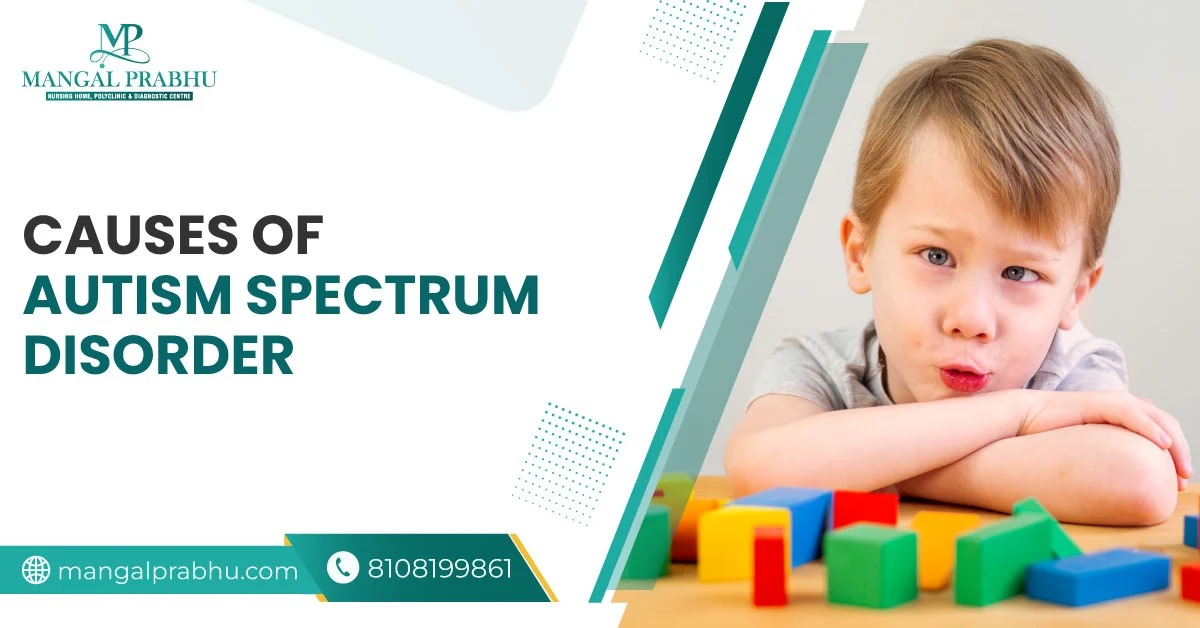
Causes of Autism Spectrum Disorder
ASD, short for Autism spectrum disorder, is a neurological disorder that affects one’s ability to interact with people, socialize, or communicate. The term “spectrum” adds multiple neurodevelopment issues, which were previously considered separate from autism. Autism is diagnosed in early childhood, mostly within the first year.
Sadly, the condition can’t be cured. You can get autism disease disorder treatment in Navi Mumbai to improve your child’s quality of life and their ability to socialize. Given the complexity of the disease and the multiple range of symptoms, it’s hard to pinpoint the exact cause of ASD. The condition is mostly associated with genetic and environmental factors.
Let’s see what causes autism and who’s at an increased risk.
1) Genetic Factors
Autism is a hereditary disorder. If one of your children has autism, there’s a 20% chance your second child will develop it, too. Genetic mutations are also linked to an increased risk of developing ASD. Fragile X Syndrome, for example, is a genetic disorder that causes autism and other brain development issues in children.
2) Environmental Factors
The risk of autism is high in children born to older parents. Some prenatal and postnatal factors can also affect your risk of developing autism.
3) Prenatal Factors
Maternal infection or health issues, such as gestational diabetes and obesity, can increase the risk of ASD in offspring. Working in an environment where you are exposed to heavy metals and environmental toxins can also affect your child’s brain development.
Certain medications you take during pregnancy are also linked to brain disorders in children. Doctors recommend iron, folic, and other prenatal vitamins during pregnancy to reduce the risk of autism in children. If a mother develops folic deficiency, the risk of neurological disorders in the offspring increases.
Your healthcare provider will recommend a second-trimester ultrasound to detect different anomalies, including the risk of autism in your offspring.
4) Postnatal Factors
Autism can occur after birth. If your baby had low birth weight, was born prematurely, or was deprived of oxygen, they are at a greater risk of developing ASD than healthy and full-term kids. Certain types of infections in children in the early years after birth can also cause autism in children. Meningitis, for instance, can cause inflammation of the tissues in your brain and affect your neurological function.
5) Neurological Factors
An abnormal brain structure or size is another common cause of ASD in children. Abnormalities in the amygdala—the part that processes emotions and the cerebral cortex—the part of your brain responsible for language, sensory development, and personality, can increase your risk of getting autism.
Children with autism might have a high level of certain neurotransmitters, such as serotonin and dopamine. Macrocephaly or large head in children can also contribute to ASD. Although it can be a family trait in some kids, macrocephaly can indicate an underlying issue, such as an enlarged brain, brain bleeding, and other complications.
Conclusion
If you notice behavioral and social issues in your child, it’s important to see a pediatrician in Navi Mumbai. Given the right treatment and early care, an autistic child can live a normal life.

What Are The Levels of Neonatal Care?
I. Introduction
If your baby is born with a lower birth weight than usual or develops any medical condition after birth neonatal care is essential for that baby. This special care from the best Neonatologist in Navi Mumbai is very important for neonatal babies because prematurity can cause many severe conditions. This effective process of care helps to lower the mortality rate, protect from infections and bacteria, and ensure the healthy development of newborn babies.
II. Levels of Neonatal Care
The entire procedure of neonatal care consists of several levels of caring including:
Level I: Well-Newborn Nursery
This is the basic level of care for healthy or slightly premature newborns who require minimal medical monitoring by pediatrics, nurses, and physicians.
Level II: Special Care Nursery
The second level provides treatment to babies who are moderately ill or born before the usual time. Level II generally requires more medical observation than those in Level I.
Level III: Neonatal Intensive Care Unit (NICU)
This level of neonatal care provides advanced treatment from the best Neonatologist in Navi Mumbai for severely ill babies with preterm birth. This level monitors critical treatment and maximum life support for those babies.
Level IV: Regional NICU
This is the ultimate level of neonatal care that offers highly specialized treatment for the most critical and severe cases. Level IV incorporates highly qualified doctors and experts to handle extremely severe conditions for babies.
III. Characteristics and Services of Each Level
Level I: Basic Care for Healthy Newborns
At this level, I provide basic monitoring to normal and healthy babies and those who are born a few times before normal birth. Pediatricians, doctors, and professional nurses look after the basic needs of babies such as feeding and physiological stability.
Level II: Care for Moderately ill or Premature Infants
Level II offers a higher level of care than level I along with continuous monitoring to provide respiratory support to underdeveloped immune systems, moderate illnesses for newborn babies, and infant ventilation or aftercare.
Level III: Intensive Care for Critically ill Newborns
The third level of neonatal care serves standard respiratory support and comprehensive care for severe medical conditions and excessive premature babies. Intensive treatment for critical illnesses and full-spectrum respiratory support is provided at this level.
Level IV: Highly Specialized Care for the Most Complex Cases
Level four of neonatal care is for specialized treatments and most complex cases for neonatal babies. NICU Hospital in Navi Mumbai provides intensive care and coordination with pediatric subspecialists.
IV. Factors Determining Level of Care Needed
Some factors like baby weighing after birth, gestational age, or other serious health conditions determine the level of your baby’s neonatal care:
Gestational Age:
Newborns born before the normal pregnancy duration require a special level of care for normal growth and a healthy future.
Birth Weight:
Babies born with low birth weight require more intensive monitoring and proper care.
Presence of Medical Conditions or Complications: Newborns with severe abnormalities, respiratory instability, infections, or other significant health issues require more specialized and standard care than others.
V. Conclusion
This specialized care is majorly important for ensuring the healthy life and viability of newborns. It is needed especially for those who are born before the gestational period or have severe medical complications. Understanding the different levels of neonatal care and the services provided at each level helps NICU Hospital in Navi Mumbai solve the specific needs of each infant, ultimately improving outcomes and supporting healthy development.
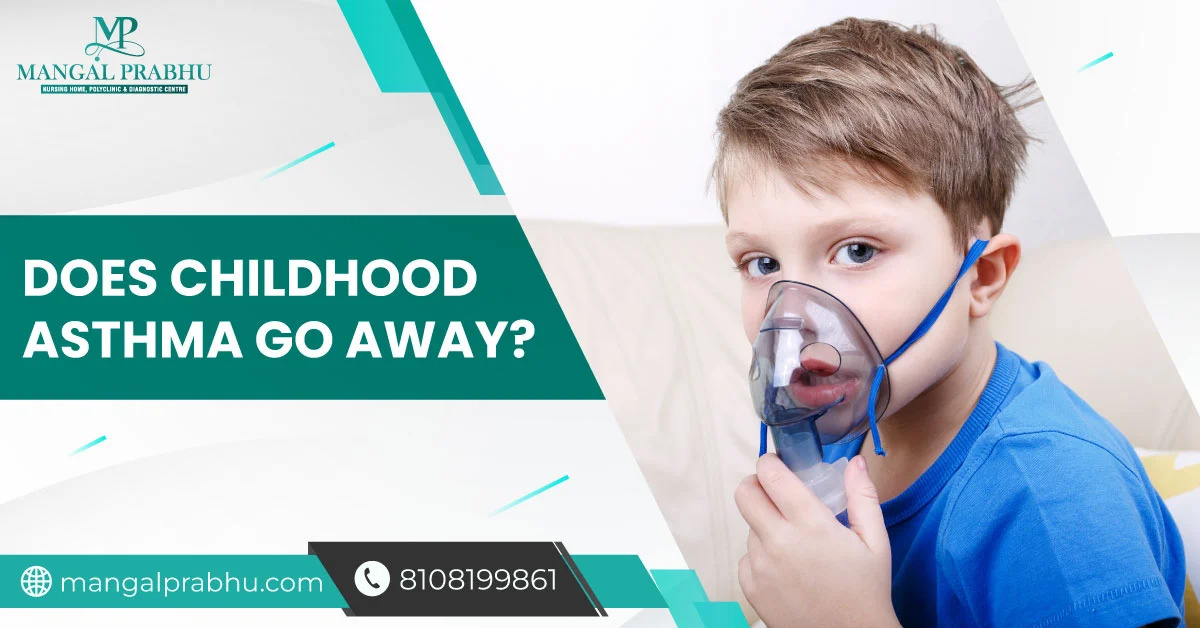
Does Childhood Asthma Go Away?
Asthma is a chronic lung condition that makes breathing harder. The airways, which carry air in and out of the lungs, become too narrow to carry enough air into the lungs. In children, asthma can cause wheezing and coughing.
Childhood asthma is also known as pediatric asthma, If your child shows symptoms of asthma, it’s important to see an asthma treatment specialist in Navi Mumbai. The condition can be life-threatening if left untreated for a long time. Let’s examine the symptoms of childhood asthma and whether it can be cured on its own.
Symptoms of Childhood Asthma
Asthma symptoms can vary from child to child. Here’s what most parents notice in their kids diagnosed with asthma:
- Coughing occurs at night, in the morning, or when your kid is involved in a physical activity. It can also be triggered by certain activities or food.
- Difficulty breathing
- Extreme fatigue
- Weakness
- A wheezing noise when your child inhales and exhales air
- Pain and tightness in the chest
Causes of Childhood Asthma
The exact cause of childhood asthma is not known, but researchers believe that a family history of asthma can increase a child’s risk of developing the same condition. Moreover, exposure to allergens or environmental factors is often associated with an increased risk of asthma. The condition is more common in children born prematurely or those who catch a respiratory infection.
Treatment Options for Childhood Asthma
Children’s asthma treatment in Navi Mumbai mainly consists of short-term and long-term medication. These are often similar to those prescribed to adults but in different dosages.
Your healthcare provider will develop an asthma management plan for your child. It will explain what to do when your child gets an asthma attack, how to manage the symptoms, how to keep your child away from triggers, and what can be done for long-term prevention.
They must carry inhalers, which open your child’s airway immediately during an asthma attack. Medications are also used to reduce inflammation in the airways to prevent them from narrowing.
Does Childhood Asthma Go Away?
Asthma is a lifelong disease that can be managed. In almost half of the children diagnosed with asthma, the symptoms disappear as they reach adolescence. Sadly, these kids tend to experience the symptoms again in their 30s and 40s. There’s no sure way to tell whether your child can outgrow asthma or not.
Factors Influencing the Severity of Childhood Asthma
The severity of childhood asthma depends on the triggers that can cause an asthma attack. Identifying these triggers and keeping your child away from them can help lower their risk of developing asthma or making it worse. Here are a few other ways that can help manage your symptoms:
- Preventing mold and mildew growth in your home
- Maintaining your child’s weight
- Keeping them away from dust, dirt, smoke, and air pollution
Untreated asthma or exposure to the triggers can lead to an asthma attack in your child, which can develop gradually or suddenly. The symptoms get much worse, and there’s a chance they might need to be hospitalized immediately.
